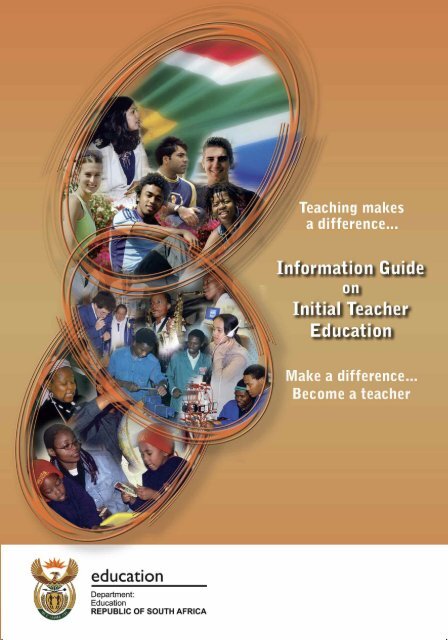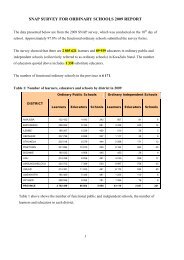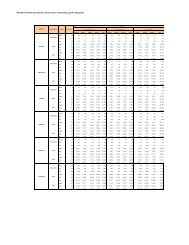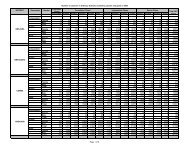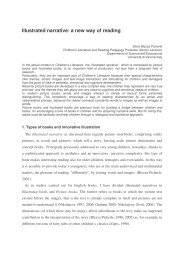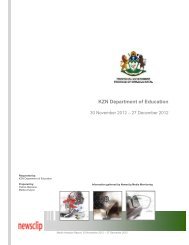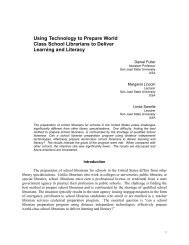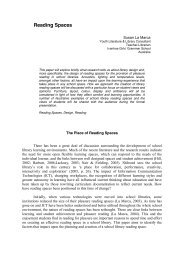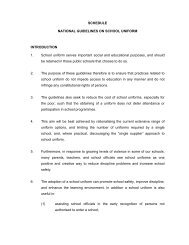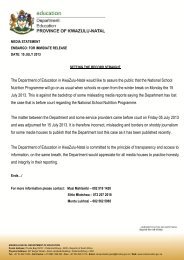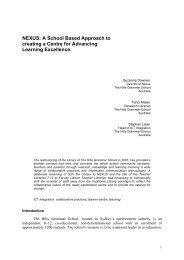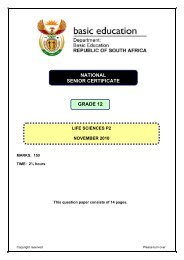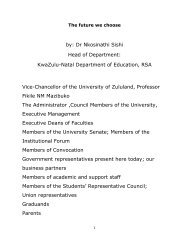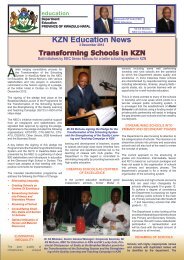Information Guide - Department of Basic Education
Information Guide - Department of Basic Education
Information Guide - Department of Basic Education
Create successful ePaper yourself
Turn your PDF publications into a flip-book with our unique Google optimized e-Paper software.
<strong>Information</strong> <strong>Guide</strong><br />
on<br />
Initial Teacher <strong>Education</strong><br />
Make teaching your career <strong>of</strong> choice<br />
www.funzalushaka.doe.gov.za<br />
www.education.gov.za<br />
Make a difference ... become a teacher
<strong>Department</strong> <strong>of</strong> <strong>Education</strong><br />
Sol Plaatje House<br />
123 Schoeman Street<br />
Private Bag X895<br />
Pretoria 0001<br />
South Africa<br />
Tel: +27 12 312-5911<br />
Fax: +27 12 321-6770<br />
Date <strong>of</strong> publication: February 2009<br />
Layout and design: Formeset Digital Tshwane
Contents<br />
Teaching as a career 2<br />
Approved initial teacher education programmes/<br />
qualifications to be completed at a university 3<br />
Areas <strong>of</strong> specialisation for a B.Ed. and for the PGCE 4<br />
Key information for applicants 5<br />
Funding available for university studies: bursaries<br />
and loans 5<br />
The Funza Lushaka (educate the nation) Bursary<br />
Programme for teaching 5<br />
Frequently asked questions about the Funza<br />
Lushaka bursary 8<br />
Back cover:<br />
University contact details
Teaching makes a difference<br />
The <strong>Department</strong> <strong>of</strong> <strong>Education</strong> is committed to providing quality education to<br />
all learners. South Africans across the country want a better future for all. By<br />
choosing to become a teacher, you would be making this vision a reality.<br />
Teaching as a career<br />
Ten good reasons why you should consider teaching as a career <strong>of</strong> choice:<br />
<br />
<br />
<br />
<br />
<br />
<br />
<br />
<br />
<br />
<br />
Turn your love <strong>of</strong> learning into a love <strong>of</strong> teaching.<br />
Make the same difference to a child’s life as your favourite teacher<br />
made to yours.<br />
Experience the joy <strong>of</strong> seeing children learn to read, write and count;<br />
and set them on a path to success.<br />
Mould and shape ordinary children into extraordinary citizens.<br />
Share your knowledge and make the world a better place.<br />
Help children understand the values that make South Africans strong<br />
and proud.<br />
Ignite the spark <strong>of</strong> curiosity in children.<br />
Pass on your love <strong>of</strong> learning and help students discover their<br />
potential.<br />
See the world through the eyes <strong>of</strong> a child and learn something in<br />
return.<br />
Serve children, your community and your country.<br />
2
Make a difference ... become a teacher<br />
Approved initial teacher education programmes/<br />
qualifications to be completed at a university<br />
There are different routes open to you:<br />
Undergraduate<br />
studies<br />
A four-year Bachelor <strong>of</strong><br />
<strong>Education</strong> degree<br />
(B.Ed.), specialising in the<br />
Foundation Phase<br />
(Grades R – 3); Intermediate<br />
Phase (Grades 4 – 6);<br />
Senior Phase (Grades 7 –<br />
9); and the Further <strong>Education</strong><br />
and Training (FET)<br />
Phase (Grades 10 –12).<br />
Undergraduate<br />
studies<br />
A three or four-year Bachelors<br />
degree, e.g. Bachelor <strong>of</strong><br />
Science, Bachelor <strong>of</strong> Engineering,<br />
Bachelor <strong>of</strong> Arts,<br />
Bachelor <strong>of</strong> Computer<br />
Science, Bachelor <strong>of</strong> Technology,<br />
in fields suitable for admission<br />
to the one-year<br />
programme: Postgraduate<br />
Certificate in <strong>Education</strong><br />
(PGCE).<br />
Graduate<br />
studies<br />
One-year Postgraduate<br />
Certificate in <strong>Education</strong><br />
(PGCE) for graduates<br />
whose degrees include<br />
majors that allow admission<br />
to the PGCE.<br />
You may choose to study for the four-year Bachelor <strong>of</strong> <strong>Education</strong> degree and<br />
specialise in a range <strong>of</strong> areas focussing on younger or older children. For<br />
instance, if you prefer teaching younger children, you could specialise in the<br />
Foundation Phase (Grades R – 3) or in the Intermediate Phase (Grades 4 – 6).<br />
On the other hand, if you prefer teaching older children, you could specialise in<br />
the Senior Phase (Grades 7 – 9) or the Further <strong>Education</strong> and Training (FET)<br />
Phase (Grades 10 –12).<br />
You may also choose, especially if your areas <strong>of</strong> choice are the Senior and FET<br />
Phases, to complete an academic degree first, e.g. Bachelor <strong>of</strong> Science,<br />
Bachelor <strong>of</strong> Engineering, Bachelor <strong>of</strong> Arts, Bachelor <strong>of</strong> Computer Science,<br />
Bachelor <strong>of</strong> Technology, etc., before completing a one-year pr<strong>of</strong>essional<br />
teaching qualification – the Postgraduate Certificate in <strong>Education</strong> (PGCE).<br />
It is important that the academic degree should include subjects/courses<br />
suitable for admission to the PGCE.<br />
3
Make teaching your career <strong>of</strong> choice<br />
Areas <strong>of</strong> specialisation for a B.Ed. and for the PGCE<br />
Foundation<br />
Phase<br />
(Grades R – 3)<br />
Intermediate<br />
Phase<br />
(Grades 4 – 6)<br />
Senior<br />
Phase<br />
(Grades 7 – 9)<br />
FET<br />
Phase<br />
(Grades 10 – 12)<br />
<br />
Foundation<br />
phase specialisation:<br />
Literacy,<br />
Numeracy and<br />
Life Skills<br />
<br />
<br />
<br />
<br />
<br />
<br />
<br />
<br />
Languages<br />
Mathematics<br />
Arts and<br />
Culture<br />
Economic and<br />
Management<br />
Sciences<br />
Life Orientation<br />
Natural<br />
Sciences<br />
Social<br />
Sciences<br />
Technology<br />
<br />
<br />
<br />
<br />
<br />
<br />
<br />
<br />
Arts and Culture<br />
Economic and<br />
Management<br />
Sciences<br />
Languages<br />
Life Orientation<br />
Mathematics<br />
Natural Sciences<br />
Social Sciences<br />
Technology<br />
<br />
<br />
<br />
<br />
<br />
<br />
<br />
<br />
<br />
<br />
<br />
<br />
<br />
<br />
<br />
<br />
<br />
<br />
<br />
<br />
<br />
<br />
<br />
<br />
<br />
<br />
<br />
<br />
<br />
Accounting<br />
Agricultural<br />
Management<br />
Practices<br />
Agricultural<br />
Sciences<br />
Agricultural<br />
Technology<br />
Business Studies<br />
Civil Technology<br />
Computer<br />
Applications<br />
Technology<br />
Consumer Studies<br />
Dance Studies<br />
Design<br />
Dramatic Arts<br />
Economics<br />
Electrical<br />
Technology<br />
Engineering<br />
Graphics and<br />
Design<br />
Geography<br />
History<br />
Hospitality Studies<br />
<strong>Information</strong><br />
Technology<br />
Languages<br />
Life Orientation<br />
Life Sciences<br />
Mathematics<br />
Mathematical<br />
Literacy<br />
Mechanical<br />
Technology<br />
Music<br />
Physical Sciences<br />
Religion Studies<br />
Tourism<br />
Visual Arts<br />
4
Teaching makes a difference<br />
Key information for applicants<br />
It is important to apply for admission to a degree <strong>of</strong> your choice at a South<br />
African university <strong>of</strong> your choice before the <strong>of</strong>ficial closing date.<br />
Any <strong>of</strong> the following people may apply for admission:<br />
Learners currently in Grade 12<br />
Graduates who want to complete a teaching qualification<br />
People who want to make a career change and become teachers<br />
Unemployed people who want to become teachers<br />
It is important to note that admission to any university will be in accordance<br />
with that university’s rules <strong>of</strong> admission. Contact the university <strong>of</strong> your choice<br />
for more information. Contact details for each public university appear on the<br />
back cover <strong>of</strong> this brochure.<br />
Funding available for university studies: bursaries and<br />
loans<br />
You can choose from a range <strong>of</strong> sources when it comes to funding your studies.<br />
These include self-funding; bursaries from government departments – both<br />
national and provincial; bursaries from corporate organisations, trusts and the<br />
like; as well as taking out a loan.<br />
From time to time, the provincial education departments (PEDs) also <strong>of</strong>fer<br />
service bursaries to prospective teachers. Student loans are available via the<br />
National Student Financial Aid Scheme (NSFAS) at www.nsfas.org.za. You<br />
may apply for NSFAS loans at your university’s Financial Aid Office. Some<br />
banks and other financial services providers also grant student loans.<br />
The Funza Lushaka (educate the nation) Bursary<br />
Programme for teaching<br />
The <strong>Department</strong> <strong>of</strong> <strong>Education</strong> <strong>of</strong>fers full-cost service bursaries (the Funza<br />
Lushaka bursary) to deserving capable first-year students who want to make<br />
teaching their career <strong>of</strong> choice, to graduates who want to complete the oneyear<br />
pr<strong>of</strong>essional teaching qualification, namely the PGCE, as well as to<br />
students in their second, third or fourth year <strong>of</strong> study who want to pursue<br />
teaching as a career. The bursary covers tuition fees; full accommodation that<br />
includes meals; books and other learning material; as well as a monthly<br />
allowance for living expenses.<br />
5
Make a difference ... become a teacher<br />
Universities have different cost structures, so the total value <strong>of</strong> a bursary may<br />
differ from institution to institution. The Funza Lushaka bursary is awarded to<br />
deserving capable students who specialise in the following priority areas:<br />
The current priority areas for the Funza Lushaka Bursary Programme are:<br />
Foundation<br />
Phase<br />
(Grades R – 3)<br />
Intermediate<br />
Phase<br />
(Grades 4 – 6)<br />
Senior<br />
Phase<br />
(Grades 7 – 9)<br />
FET<br />
Phase<br />
(Grades 10 –12)<br />
<br />
Foundation<br />
Phase<br />
specialisation<br />
<br />
<br />
<br />
<br />
<br />
African<br />
Languages<br />
English<br />
Language<br />
Mathematics<br />
Natural<br />
Sciences<br />
Technology<br />
<br />
<br />
<br />
<br />
<br />
African<br />
Languages<br />
English<br />
Language<br />
Mathematics<br />
Natural<br />
Sciences<br />
Technology<br />
<br />
<br />
<br />
<br />
<br />
<br />
<br />
<br />
<br />
<br />
<br />
<br />
<br />
African Languages<br />
Agricultural<br />
Sciences<br />
Agricultural<br />
Technology<br />
Civil Technology<br />
Computer<br />
Applications<br />
Technology<br />
Electrical<br />
Tech-nology<br />
Engineering<br />
Graphics and<br />
Design<br />
English Language<br />
<strong>Information</strong><br />
Technology<br />
Life Sciences·<br />
Mathematics<br />
Mathematical<br />
Literacy<br />
Mechanical<br />
Technology<br />
Physical Sciences<br />
You need to apply for admission to obtain a teaching qualification (a B.Ed. or a<br />
PGCE) or a Bachelors degree (e.g. B.Sc., BTech, B.A.) with at least one major<br />
course in a priority area, at a university <strong>of</strong> your choice. You can only apply for<br />
a bursary once you have gained admission to a university. The Financial Aid<br />
6
Make teaching your career <strong>of</strong> choice<br />
Office and/or the Faculty or School <strong>of</strong> <strong>Education</strong> at your university will provide<br />
you with information on how to apply for the bursary. Also visit<br />
www.funzalushaka.doe.gov.za for more information.<br />
The bursary is awarded for one academic year at a time and, upon pro<strong>of</strong> <strong>of</strong><br />
academic success, the bursary may be renewed each year until you have<br />
qualified as a teacher. As a bursary holder, you will be required to reapply by<br />
the end <strong>of</strong> October for the following year. You will be required to do one year <strong>of</strong><br />
teaching for every year for which you have received a bursary.<br />
What the bursary covers<br />
A Funza Lushaka bursary covers all your essential expenses. These include<br />
tuition, full accommodation that includes meals, books and other learning<br />
material, as well as a monthly allowance for living expenses including travel<br />
costs and the like.<br />
Universities have different cost structures, so the total value <strong>of</strong> a bursary may<br />
differ from institution to institution, and may also differ between students at the<br />
same institution, depending on the programmes they are studying.<br />
Conditions for repeating a year<br />
The bursary period may be extended to cover one additional year for a degree<br />
programme, or the time required for completion <strong>of</strong> one additional course in the<br />
PGCE programme. Only one such extension will be granted. Any additional<br />
time required will be at your own cost.<br />
Conditions for repayment <strong>of</strong> a bursary<br />
The bursary has to be repaid only if you fail to qualify, fail to apply for a teaching<br />
post with a provincial education department (PED) at a public school, fail to<br />
take up a teaching post with a PED at a public school, leave a teaching post<br />
with a PED before the end <strong>of</strong> your contracted service period, or fail to meet a<br />
requirement <strong>of</strong> the bursary agreement.<br />
7
Teaching makes a difference<br />
Frequently asked questions about the Funza Lushaka<br />
Bursary programme<br />
The programme<br />
1. What is the Funza Lushaka Bursary Programme?<br />
It is a new multi-year programme, which was launched in 2007, to promote<br />
teaching at public schools as the career <strong>of</strong> choice for able and committed<br />
South Africans. Full-cost bursaries are available to enable eligible students<br />
to complete a full teaching qualification in an area <strong>of</strong> national priority.<br />
Recipients <strong>of</strong> a Funza Lushaka bursary are required to teach in a<br />
provincial education department (PED) for the same number <strong>of</strong> years for<br />
which they have received a bursary.<br />
Roles and responsibilities<br />
2. How are the roles and responsibilities, pertaining to the Funza<br />
Lushaka Programme, divided?<br />
This is a national programme that is run locally at every higher education<br />
institution (HEI) that <strong>of</strong>fers teacher education programmes. It is funded by<br />
the National Treasury and executed by the <strong>Department</strong> <strong>of</strong> <strong>Education</strong><br />
(DoE).<br />
The National Student Financial Aid Scheme (NSFAS) administers the<br />
programme on behalf <strong>of</strong> the DoE via the Student Financial Aid Office at<br />
each HEI.<br />
Eligible students must meet the admission criteria <strong>of</strong> the academic<br />
programme at the HEI to which they apply, and must meet the national<br />
selection criteria for a Funza Lushaka bursary. Provincial selection<br />
committees are constituted to guide the selection. (See paragraphs 13 to<br />
16 on selection matters.)<br />
Once qualified, bursary recipients are employed by a PED.<br />
Applications and eligibility<br />
3. How do I apply?<br />
Prospective bursars must first apply for admission at a higher education<br />
institution. Once you have gained admission to a university, you can apply<br />
8
Make a difference ... become a teacher<br />
for a bursary. The Financial Aid Office and/or the Faculty or School <strong>of</strong><br />
<strong>Education</strong> at your university will provide you with information on how to<br />
apply for a bursary.<br />
4. Where can I obtain more information about the bursary programme?<br />
Student financial aid <strong>of</strong>fices will provide details regarding financial matters,<br />
service obligations, etc. Staff members <strong>of</strong> the Faculty or School <strong>of</strong><br />
<strong>Education</strong> will provide information on teaching as a pr<strong>of</strong>ession, academic<br />
programmes and your eligibility for admission. For more information, log<br />
onto www.funzalushaka.doe.gov.za.<br />
5. How does an institution determine whether a student’s academic<br />
programme complies with the priority areas’ selection criteria?<br />
The bursary programme is designed to boost the recruitment <strong>of</strong> teachers,<br />
especially in priority areas. In most cases, the Faculty or School <strong>of</strong><br />
<strong>Education</strong> staff members will be able to determine whether a student’s<br />
programme fits the teaching priority areas. In complicated cases, staff will<br />
have to use their own judgement, bearing in mind the purpose <strong>of</strong> the<br />
programme.<br />
6. What are the priority areas?<br />
Grades R – 9: Foundation Phase; African Languages; English Language;<br />
Mathematics; Natural Sciences; Technology.<br />
Grades 10 – 12: African Languages; English Language; Mathematics;<br />
Mathematical Literacy; Agricultural Sciences; Life Sciences; Physical<br />
Sciences; Agricultural Technology; Civil Technology; Electrical Technology;<br />
Mechanical Technology; <strong>Information</strong> Technology; Computer Applications<br />
Technology; and Engineering Graphics and Design.<br />
7. What programmes will be funded?<br />
<br />
<br />
<br />
Bachelor <strong>of</strong> <strong>Education</strong> (B.Ed.);<br />
Postgraduate Certificate in <strong>Education</strong> (PGCE); and<br />
Bachelors degrees, e.g. B.A., B.Sc., B.Com. and BTech degrees, with<br />
majors that are suitable for admission to a PGCE programme, which<br />
you, as the recipient <strong>of</strong> the bursary, will agree to enter into upon<br />
graduation. At least one <strong>of</strong> the major subjects <strong>of</strong> these degrees must<br />
be selected from the list <strong>of</strong> priority area subjects.<br />
9
Make teaching your career <strong>of</strong> choice<br />
8. Are there <strong>of</strong>ficial quotas for the distribution <strong>of</strong> bursaries according to<br />
programme, year <strong>of</strong> study or priority area?<br />
Yes. The distribution according to programme will be determined by the<br />
DoE, depending on national priorities. Students in any year <strong>of</strong> study will be<br />
considered, provided that at least one major subject for their degree comes<br />
from the list <strong>of</strong> priority area subjects.<br />
9. Are first-year students eligible?<br />
Yes, first-year students in the appropriate programmes are eligible.<br />
10. Are Advanced Certificate in <strong>Education</strong> (ACE) students eligible?<br />
No. Funza Lushaka bursaries are available only for the initial pr<strong>of</strong>essional<br />
education <strong>of</strong> teachers.<br />
11. Are distance education and part-time students eligible for a bursary?<br />
Yes, provided they are eligible in all other respects.<br />
Selection matters<br />
12. Who should sit on a bursary selection committee?<br />
Provincial selection committees will be constituted to guide the selection<br />
<strong>of</strong> bursars. The composition <strong>of</strong> the committees must be such so as to<br />
include academic staff members from the Faculty or School <strong>of</strong> <strong>Education</strong>,<br />
representatives <strong>of</strong> the financial aid <strong>of</strong>fices <strong>of</strong> the HEIs in the province, as<br />
well as experienced pr<strong>of</strong>essional representatives <strong>of</strong> the PED concerned.<br />
13. What selection criteria should be applied?<br />
The criteria applied by the selection committee must be clear, empiricallybased,<br />
transparent and documented, and must include:<br />
<br />
<br />
<br />
<br />
Academic ability.<br />
Eligibility for one <strong>of</strong> the academic programmes for which the bursary<br />
is granted.<br />
Commitment to a teaching career, which includes an interest in<br />
working with young people; enthusiasm for a pr<strong>of</strong>essional career in<br />
teaching; readiness to face and surmount difficult challenges; and<br />
personal integrity.<br />
Commitment to teach at any school to which a you, as a student, may<br />
be appointed by a PED.<br />
10
Teaching makes a difference<br />
All else being equal, selection should favour candidates from rural areas,<br />
candidates who wish to teach in rural areas, and candidates whose<br />
financial position would otherwise exclude them from enrolment for a<br />
teaching qualification.<br />
14. Will late applications for admission to a university be considered?<br />
This is a matter for each institution to determine in terms <strong>of</strong> its admission<br />
procedures. Institutions may consider late applications if they still have<br />
places to fill.<br />
15. Will late applications for a bursary be considered?<br />
The deadline for first-time bursary applications is set so that it<br />
accommodates students who may gain late admission to the university.<br />
Therefore, late applications for the bursary will not be considered.<br />
Money matters<br />
16. Have HEIs been allocated a certain number <strong>of</strong> bursaries or received<br />
a specific allocation <strong>of</strong> funds for bursaries?<br />
Institutions receive funds, not bursaries. Each institution will pay out<br />
bursary funds in accordance with the purpose <strong>of</strong> the programme and its<br />
own cost structure.<br />
17. What happens when institutions are not able to use all the funds<br />
allocated to them?<br />
If some institutions are unable to use all the funds allocated to them, the<br />
balance will be redistributed amongst other institutions where the demand<br />
is greater. This will be done once the situation has been monitored at the<br />
end <strong>of</strong> the normal registration period.<br />
18. How much is a Funza Lushaka bursary worth?<br />
Funza Lushaka bursaries cover all the recipient's essential expenses.<br />
Institutions have different cost structures, so the total value <strong>of</strong> a bursary<br />
may differ from institution to institution, and possibly even between<br />
individual students within an institution.<br />
19. What does a bursary cover?<br />
Registration fees, tuition fees, residence fees or approved accommodation<br />
and the cost <strong>of</strong> meals, a book and learning material allowance, as well as<br />
a monthly allowance for living expenses.<br />
11
Make a difference ... become a teacher<br />
20. May a student accept a bursary for fewer years than the number <strong>of</strong><br />
years required to complete a programme?<br />
Yes, provided that the bursary covers the year in which the teaching<br />
qualification is completed.<br />
21. May I as a student, accept less per annum than the total amount on<br />
<strong>of</strong>fer?<br />
Yes. However, for every year that the bursary is received, you must serve<br />
one year in a provincial teaching post. This is regardless <strong>of</strong> the amount that<br />
you accept.<br />
22. May a student who has another bursary receive a full-cost Funza<br />
Lushaka bursary?<br />
If the terms and conditions <strong>of</strong> the two bursaries do not conflict with each<br />
other, the student could retain that bursary, as well as accept a Funza<br />
Lushaka bursary. If the other bursary carries conditions that will prohibit the<br />
student from satisfying conditions attached to the Funza Lushaka bursary,<br />
e.g. the service obligation, then the student should not apply for the Funza<br />
Lushaka bursary.<br />
23. If I have to repeat a year, will the bursary be paid for that extra year?<br />
The bursary period will be extended to cover one additional year <strong>of</strong> study<br />
for a degree programme or the time required for completion <strong>of</strong> one<br />
additional course in the PGCE programme. Only one such extension will<br />
be granted. Any additional time required will be at your own cost. Granting<br />
<strong>of</strong> an extension is, however, not automatic. You will have to show<br />
that you have been diligent with regard to your studies.<br />
24. Who pays for costs incurred over and above the allocated bursary<br />
amount?<br />
You, as the student.<br />
25. Is the bursary renewable?<br />
Yes. The bursary is awarded for one academic year at a time and, upon<br />
pro<strong>of</strong> <strong>of</strong> academic success, the bursary may be renewed each year until<br />
you have qualified as a teacher. However, as recipient <strong>of</strong> the bursary, you<br />
are required to reapply every year for the renewal <strong>of</strong> the bursary.<br />
26. How will my accommodation and living expenses be paid?<br />
In accordance with the institution’s normal practice with regard to NSFAS<br />
awards.<br />
12
Make teaching your career <strong>of</strong> choice<br />
Service agreement<br />
27. Must I, as the recipient <strong>of</strong> a bursary, receive a copy <strong>of</strong> the service<br />
agreement?<br />
Yes. You must carefully read the agreement before signing it, and a<br />
signed copy must then be given to you. A copy <strong>of</strong> the agreement<br />
documentation can be accessed from the Funza Lushaka website<br />
(www.funzalushaka.doe.gov.za).<br />
28. For how many years will I, as the recipient <strong>of</strong> a bursary, be required<br />
to teach?<br />
You will be required to teach one year for every year for which you have<br />
received a bursary.<br />
29. If a student changes from an NSFAS loan to a Funza Lushaka<br />
bursary, will the years pertaining to the NSFAS loan form part <strong>of</strong> the<br />
service contract?<br />
No. The NSFAS loan and the bursary have different conditions.<br />
30. Must the bursary be repaid?<br />
The bursary has to be repaid only if you fail to qualify, fail to apply for a<br />
teaching post with a PED at a public school, fail to take up a teaching post<br />
with a PED at a public school, leave a teaching post with a PED before the<br />
end <strong>of</strong> your contracted service period, or otherwise fail to meet a<br />
requirement <strong>of</strong> the bursary agreement.<br />
31. How much will have to be repaid?<br />
The full amount <strong>of</strong> the bursary received in terms <strong>of</strong> the programme, less<br />
one year's funding for every year spent teaching at a public school.<br />
32. Will interest have to be paid on the amount owing?<br />
Yes, at an interest rate determined from time to time by NSFAS.<br />
33. Who determines the placement <strong>of</strong> newly qualified teachers in terms<br />
<strong>of</strong> the programme?<br />
Qualified recipients <strong>of</strong> bursaries must apply for an appropriate public<br />
school position with the PED <strong>of</strong> their choice. The PED concerned will<br />
determine whether there is a suitable post available. If not, the applicant<br />
will be <strong>of</strong>fered employment with a PED that does have suitable vacancies.<br />
Offers <strong>of</strong> employment will be made subject to the Employment <strong>of</strong><br />
Educators Act, 1998, and the South African Schools Act, 1996.<br />
13
Teaching makes a difference<br />
34. Are Funza Lushaka bursary recipients eligible for school governing<br />
body (SGB) posts at public schools?<br />
No. As a bursar you may only accept an SGB post after you have fulfilled<br />
your contractual obligations to a PED.<br />
35. Are Funza Lushaka bursary recipients able to take a “gap year”<br />
immediately after qualifying?<br />
No. Students are required to accept a teaching post immediately after<br />
qualifying; i.e. an extension will not be granted to a qualifying student.<br />
36. Will an extension be granted to qualifying students to complete<br />
further studies?<br />
No. Students are required to accept a teaching post immediately after<br />
qualifying; i.e. an extension will not be granted to a qualifying student.<br />
37. Are foreign students eligible for Funza Lushaka bursaries?<br />
No. NSFAS will not enter into a contract with a foreign student or a student<br />
who holds a temporary resident’s permit.<br />
More information<br />
38. Where can additional information be obtained?<br />
<strong>Information</strong> on the Funza Lushaka Programme may be obtained from<br />
www.education.gov.za or from www.funzalushaka.doe.gov.za.<br />
14
Contact details for South African public universities<br />
University <strong>of</strong> Cape Town<br />
Tel: 021 650 4500<br />
Private Bag X3<br />
RONDEBOSCH 7701<br />
Western Cape<br />
www.uct.ac.za<br />
University <strong>of</strong> Fort Hare<br />
Tel: 040 602 2011<br />
Private Bag X1314<br />
ALICE 5700<br />
Eastern Cape<br />
www.ufh.ac.za<br />
University <strong>of</strong> the Free State<br />
Tel: 051 401 9111<br />
PO Box 339<br />
BLOEMFONTEIN 9300<br />
Free State<br />
www.ufs.ac.za<br />
University <strong>of</strong> Johannesburg<br />
Tel: 011 559 2911<br />
PO Box 524<br />
AUCKLAND PARK 2006<br />
Gauteng<br />
www.uj.ac.za<br />
University <strong>of</strong> KwaZulu-Natal<br />
Tel: 031 650 4500<br />
DURBAN 4041<br />
KwaZulu-Natal<br />
www.ukzn.ac.za<br />
University <strong>of</strong> Limpopo<br />
Tel: 015 268 9111<br />
Private Bag X1106<br />
SOVENGA 0727<br />
Limpopo<br />
www.ul.ac.za<br />
Nelson Mandela Metropolitan<br />
University<br />
Tel: 041 504 3111<br />
PO Box 1600<br />
PORT ELIZABETH<br />
Eastern Cape<br />
www.nmmu.ac.za<br />
North West University<br />
Tel: 018 299 1111<br />
Private Bag X6001<br />
POTCHEFSTROOM 2520<br />
North West<br />
www.unw.ac.za<br />
University <strong>of</strong> Pretoria<br />
Tel: 012 420 4111<br />
PRETORIA 0002<br />
Gauteng<br />
www.up.ac.za<br />
Tshwane University <strong>of</strong><br />
Technology<br />
Tel: 012 382 5911<br />
Private Bag X680<br />
PRETORIA 0002<br />
Gauteng<br />
www.tut.ac.za<br />
Durban University <strong>of</strong><br />
Technology<br />
Tel: 031 373 2000<br />
PO Box 1334<br />
DURBAN 4000<br />
KwaZulu-Natal<br />
www.dut.ac.za<br />
Rhodes University<br />
Tel: 046 603 8111<br />
PO Box 94<br />
GRAHAMSTOWN 6140<br />
Eastern Cape<br />
www.ru.ac.za<br />
University <strong>of</strong> South Africa<br />
Tel: 012 429 3111<br />
PO Box 392<br />
UNISA 0003<br />
Gauteng<br />
www.unisa.ac.za<br />
University <strong>of</strong> Stellenbosch<br />
Tel: 021 808 9111<br />
Private Bag X1<br />
MATIELAND 7602<br />
Western Cape<br />
www.us.ac.za<br />
Walter Sisulu University<br />
Tel: 047 502 2111<br />
Private Bag X1<br />
UMTATA 5100<br />
Eastern Cape<br />
www.wsu.ac.za<br />
University <strong>of</strong> Venda<br />
Tel: 015 962 8000<br />
Private Bag X2220<br />
THOHOYANDOU 0950<br />
Limpopo<br />
www.univen.ac.za<br />
University <strong>of</strong> the Western<br />
Cape<br />
Tel: 021 959 2911<br />
Private Bag X17<br />
BELLVILLE 7535<br />
Western Cape<br />
www.uwc.ac.za<br />
University <strong>of</strong> the Witwatersrand<br />
Tel: 011 717 1000<br />
PO WITS 2050<br />
Gauteng<br />
www.wits.ac.za<br />
University <strong>of</strong> Zululand<br />
Tel: 035 902 6000<br />
Private Bag X1001<br />
KwaDLANGEZWA 3886<br />
KwaZulu-Natal<br />
www.unizul.ac.za<br />
Central University <strong>of</strong><br />
Technology<br />
Tel: 051 507 3911<br />
Private Bag X20539<br />
BLOEMFONTEIN 9300<br />
Free State<br />
www.cut.ac.za<br />
Cape Peninsula University<br />
<strong>of</strong> Technology<br />
Tel: 021 680 1500<br />
PO Box 652<br />
CAPE TOWN 8000<br />
Western Cape<br />
www.cput.ac.za


